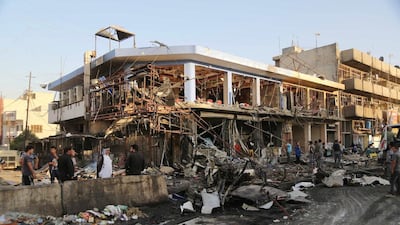When the Islamic State, formerly known as the Islamic State of Iraq and the Levant, increased its activities in Iraq, resulting in the displacement of minority communities, much of the world looked on in horror. Almost immediately, much of the global discourse then turned to Muslims at large – where are the condemnations of this outrageous phenomenon? It’s not the first time that such demands have been made – nor will it be the last – but it’s not all on the Muslim community or their religious establishment.
There are examples to be drawn from similar times. After the September 11, 2001 attacks in the United States, or July 7, 2005 bombings in Britain, the public discourse quickly jumped to assigning responsibility upon the Muslim community at large to express their condemnation. The condemnation was not merely expected for the acts involved but also of the ideology that led to those events.
A few critical issues arise when this kind of framing takes place. The first is simple: why is it that Muslims are expected to constantly condemn the radical acts of their co-religionists? Are other religious groups thus so problematised? Have Buddhists, for example, worldwide been expected to condemn the actions of Buddhists in Myanmar against the Rohingya, even though Buddhist monks were involved in those human rights violations? Was the Orthodox Church at large held morally at risk if it did not condemn and deplore the genocide that took place in Bosnia, although some priests were involved with the radical portion of the Serbian side in that conflict?
More recently, do all Jews bear responsibility to publicly condemn the bombardments on Gaza that led to hundreds of dead civilians, because many Israeli Jewish clerics supported the offensive?
It might be laudable for all those religious communities to condemn injustice wherever it takes place – and maybe even more so when it is in their name. But surely they should not be held responsible or morally complicit in some way when they do not? And if they are, why is this kind of moral framing not applied universally?
The second issue is often missed: if Muslims condemn such acts, then why aren’t those condemnations registering? The common retort is that the denunciations don’t happen – except, they do.
Several years ago, I was at a small seminar held by a noted American think-tank, which brought together a number of religious leaders from around the world, including Christian, Jewish and Muslim ones. One of the participants asked the Muslim participants why they hadn’t attacked terrorism. A Muslim religious scholar responded, “I wrote a whole book on the subject” and produced a tome of thousands of words on various aspects of terrorism.
One website titled The American Muslim has catalogued more than a decade of responses to terrorism in English as a resource for the media, but also, one suspects, out of frustration that such a resource had to be constantly referred to.
Yet it happens again and again. At that same seminar, the Muslim scholar went on to elaborate about how much effort he went to in order to promote the work he had written. His fellow participant then retorted: “Why haven’t I heard about it, then?” Therein lies the key and critical question.
Within a few days after the July 7 bombings in London, one Muslim scholar, Shaykh Dr Afifi Al Akiti, wrote a critical and lengthy legal opinion (fatwa) that demolished the pseudo-religious justifications for suicide bombings. At the time, I was being asked by various British government agencies for advice on radicalisation and terrorism. When I pointed to this opinion in our discussions, it was invariably news to them. This was despite the fact that the author was not only a religious authority but also an Oxford University academic – so, he was hardly obscure. When it came to the media, the situation was just as bad, if not worse. Attention was not being paid to these sorts of efforts.
A decade on, it’s not clear that enough has changed. Muslim communities are still being placed into that same frame where they are expected to hold moral accountability for crimes they’re not responsible for, although other religious communities are not. When Muslim religious communities do condemn such atrocities, it invariably takes the media a long time to notice – if at all. A plethora of Muslim religious authorities and spokespeople have condemned the Islamic State – but the discussion is still, ‘Why haven’t Muslims condemned this?’.
If it is accepted that Muslim religious authorities and community representatives ought to engage with this media frame – which arguably, they ought to, simply due to the nature of the way the world works – then they do hold the responsibility of ensuring they have suitable outreach mechanisms. A decade on, it’s not altogether evident that they’ve created those mechanisms sufficiently, given the challenges in front of them. On the contrary, they are constantly lagging behind, and not regarding this with sufficient importance.
If mainstream Muslim religious authorities and representatives do step up, and they often do, that needs to be registered. Otherwise, they might just give up on such engagement altogether. That, surely, is what the extremists and radicals would want, as it would make their own voices that much louder. We ought not help them in that regard.
Dr HA Hellyer is an associate fellow at the Royal United Services Institute in London, and the Brookings Institution in Washington DC
On Twitter: @hahellyer


